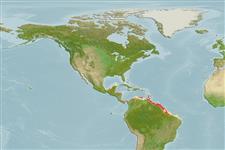Teleostei (teleosts) >
Eupercaria/misc (Various families in series Eupercaria) >
Sciaenidae (Drums or croakers)
Etymology: Lonchurus: Greek, logche = lance + Greek, oura = tail (Ref. 45335).
More on author: Bloch.
Environment: milieu / climate zone / depth range / distribution range
Ecology
Marine; brackish; demersal. Tropical
Western Atlantic: Colombia to the Amazon delta in Brazil including the Windward islands.
Size / Weight / Age
Maturity: Lm ? range ? - ? cm
Max length : 30.0 cm TL male/unsexed; (Ref. 3702); common length : 22.0 cm TL male/unsexed; (Ref. 3702)
Dorsal spines (total): 10 - 12; Dorsal soft rays (total): 37 - 39; Anal spines: 2; Anal soft rays: 7 - 9. Body often brownish to yellowish, slightly darker above. All fins darkish, pectoral fins long and jet black. Base of pelvic and anal fins yellowish. Inside of gill cover dusky. Mouth large, but inferior, nearly horizontal. Chin with a pair of moderately long, slender barbels (longer than eye diameter). Pectoral fins very long, upper rays filamentous, extending to caudal peduncle. Pelvic fins with first soft ray filamentous, extending beyond anus. Gas bladder reduced in size, much shorter than head length; bearing anteriorly 1 pair of appendages, the first short and horn-like, the second long, tube-like, and directed backward (Ref 51721).
Found usually over sandy to muddy bottoms in coastal marine and brackish waters. Important food fish.
Life cycle and mating behavior
Maturity | Reproduction | Spawning | Eggs | Fecundity | Larvae
Chao, L.N., 1978. Sciaenidae. In W. Fischer (ed.) FAO species identification sheets for fishery purposes. West Atlantic (Fishing Area 31). Volume 4. FAO, Rome. (Ref. 3702)
IUCN Red List Status (Ref. 130435: Version 2024-1)
Threat to humans
Harmless
Human uses
Fisheries: minor commercial; bait: usually
Tools
Special reports
Download XML
Internet sources
Estimates based on models
Preferred temperature (Ref.
123201): 26.8 - 28, mean 27.5 °C (based on 162 cells).
Phylogenetic diversity index (Ref.
82804): PD
50 = 0.7500 [Uniqueness, from 0.5 = low to 2.0 = high].
Bayesian length-weight: a=0.00575 (0.00280 - 0.01185), b=3.12 (2.95 - 3.29), in cm total length, based on LWR estimates for this (Sub)family-body shape (Ref.
93245).
Trophic level (Ref.
69278): 3.5 ±0.4 se; based on size and trophs of closest relatives
Resilience (Ref.
120179): High, minimum population doubling time less than 15 months (Preliminary K or Fecundity.).
Fishing Vulnerability (Ref.
59153): Low vulnerability (20 of 100).
